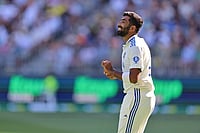The exit of Jyotiraditya Scindia from the Congress party was long in the making. The reasons for his unease within the party had been no secret either - he had lost out to Kamal Nath in the race to become the Chief Minister of Madhya Pradesh in December 2018 and then found his ambition to be appointed the state Congress chief unfulfilled because of satraps like Nath and Digvijaya Singh. Then came his shock defeat in the Lok Sabha polls.
With Rahul Gandhi stepping down as Congress president in May last and the return of Sonia Gandhi as interim party chief, Scindia began weighing his options outside the Congress, realising the infamous Old Guard wouldn't let younger leaders get any pivotal roles in the party. On Monday, with Congress still dithering on giving him an assurance of a Rajya Sabha nomination from M.P and appointing him as the state party chief, the penny finally dropped. Scindia bid goodbye to the party he had joined at the age of 30, years after the sudden demise of his father, the late Madhavrao Scindia, in 2001. The 49-year-old Gwalior royal met Prime Minister Narendra Modi and signaled his willingness to switch to the BJP along with his loyalists in M.P; that Scindia had been a Congress Lok Sabha for four terms, a Union minister in the UPA government and national general secretary of the party working closely with Rahul Gandhi and Priyanka Gandhi Vadra was all in the past and had no political worth anymore.
But that's Scindia and his move to the BJP, imminent for several months now, is now done and dusted. What next? Sources close to the Gwalior royal say he has been assured of a Rajya Sabha nomination from MP and a cabinet berth by the BJP leadership of Modi and Amit Shah.
The bigger question is whether Scindia's defection from the Congress, a party his father Madhavrao Scindia had embraced back in 1980 despite being the son of Jana Sangh stalwart and BJP co-founder Vijayaraje Scindia, will have any impact on the Grand Old Party which is already in a state of drift and unending existential crisis.
The reasons for Scindia's disillusionment with the Congress are not unique to him alone. Sources in the Grand Old Party say several of the party's young leaders - almost all of them dynasts and with a strong sense of entitlement just like Scindia - wish to explore a political future outside the Congress party. Scindia's rebellion and subsequent defection can now inspire these young leaders to follow through on their hitherto veiled threats to the party veterans of not taking them for granted.
The immediate challenge for the Congress would be to prevent an encore in Rajasthan where deputy chief minister Sachin Pilot has been unhappy with being made to constantly play second fiddle to chief minister Ashok Gehlot. Pilot, it has for long been speculated, has kept his channels open with the BJP and is not averse to switching sides or launch his own political outfit. Like Scindia, Pilot, too, is a leader of pedigree - the son of late Congress veteran Rajesh Pilot. His wife, Sara Pilot, is former J&K chief minister Farooq Abdullah's daughter and is currently fighting a legal battle in the Supreme Court for the release of her father and brother, Omar Abdullah, from the nearly seven-month-long house arrest that they have been under because of orders from the Modi government since the abrogation of Article 370.
Pilot was among the first young Congress leaders to comment on the evolving situation in M.P when Scindia loyalists went missing. His comment that the leaders in M.P should "resolve their differences" is as relevant to his party's condition in Rajasthan as in Scindia's home state.
Besides Pilot, sources say Congress leaders like Jitin Prasada in U.P, Milind Deora in Maharashtra, Kuldeep Bishnoi in Haryana and Vikramaditya Singh in J&K also realise that the deepening rot within the Congress and the absence of any sign of revival is only detrimental to their own political ambitions.
During the Lok Sabha polls, Prasada - a former Union minister - had almost decided to quit the Congress but was pacified by Rahul and Priyanka. Ever since, though Priyanka has made an effort to consult him for every party decision relevant to U.P, Prasada has kept his political options open. A Brahmin face, though with little political clout beyond central U.P, Prasada is a prominent figure among the Congress's young leaders. His father, late Jitendra Prasad, was a party veteran known most famously for challenging Sonia Gandhi for the post of Congress president in the late 1990s and losing the contest decisively.
Deora and Vikramaditya Singh too fall in the category of Congressmen seen by many in the media as individuals with personal political clout and appeal. Singh, son of Congress veteran and J&K royal Karan Singh, and Deora, son of late Congress leader Murli Deora, have been vocal about the drift within their party and the need for course correction. Though their arguments for an overhaul of the Congress are not devoid of merit, many within the party feel they are only raising these concerns to justify their imminent exit.
The only dynasts of consequence within the party who seem undeterred by this churning are Rahul and Priyanka Gandhi, comfortable in their faith that whatever may be left of their party at the end of this crisis, their central place in the party will not be challenged. As for their place in India's politics - they might not have any if they are leaders without a party. For those jumping ship, like Scindia today, the taint of being ideologically malleable and politically opportunistic will perhaps be forgotten just as soon as they return to a victory streak at the hustings.
















